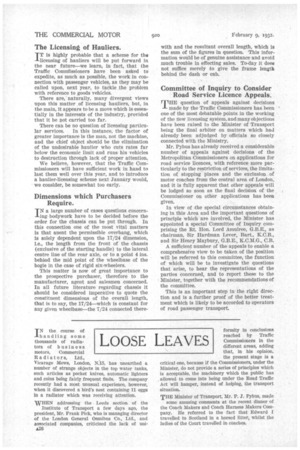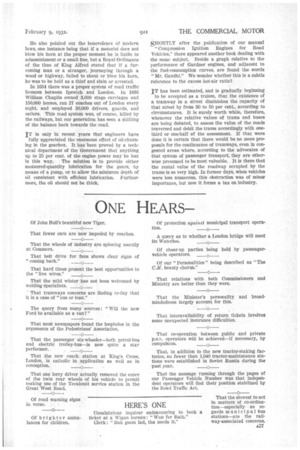TN the course of 1-handling some thousands of radiators of
Page 28

Page 29

If you've noticed an error in this article please click here to report it so we can fix it.
business motors, Commercial Radiators, Ltd., Vicarage Mews, London, N.I5, has unearthed a number of strange objects in the top water tanks, such articles as pocket knives, automatic lighters and coins being fairly frequent finds. The company recently had a most unusual experience, however, when it discovered a bird's nest containing n eggs in a radiator which was receiving attention.
WHEN addressing the Leeds section of the Institute of Transport a few days ago, the president, Mr. Frank Pick, who is managing director of the London General, Omnibus Co., Ltd., and associated companies, criticized the lack of uniA26 formity in conclusions reached by Traffic Commissioners in the different areas, adding that, in his opinion, the present stage is a critical one, because if the Commissioners, under the Minister, do not provide a series of principles which is acceptable, the machinery which the public has allowed to come into being under the Road Traffic Act will hamper, instead of helping, the transport situation.
THE Minister of Transport, Mr. P. J. Pybus, made some amusing comments at the recent dinner of the Coach Makers and Coach Harness Makers Company. He referred to the fact that Edward I travelled to Scotland in a horsed litter, whilst the ladies of the Court travelled in coaches. He also pointed out the benevolence of modern laws, one instance being that if a motorist does not blow his horn at the proper moment he is liable to admonishment or a small fine, but a Royal Ordinance of the time of King Alfred stated that if a farcoming man or a stranger, journeying through a wood or highway, failed to shout or blow his horn, he was to be held as a thief and slain or arrested.
In 1654 there was a proper system of road traffic licences between Ipswich and London. In 1836 William Chaplin owned 3,000 stage carriages and 150,000 horses, ran 27 coaches out of London every night, and employed 30,000 drivers, guards, and ostlers, This road system was, of course, killed by the railways, but our generation has seen a shifting of the balance back towards the road.
IT is only in recent years that engineers have fully appreciated the enormous effect of oil-churning in the gearbox. It has been proved by a technical department of the Government that anything up to 25 per cent, of the engine power may be lost in this way. The solution is to provide either measured-quantity lubrication for the gears, by means of a pump, or to allow the minimum depth of oil consistent with efficient lubrication, Furthermore, the oil should not be thick. SHORTLY after the publication of our manual• "Compression Ignition Engines for Road Vehicles," there appeared another book dealing with the same subject. Beside a graph relative to the performance of Gardner engines, and adjacent to the fuel-consumption curves, are found the words "Mr. Gandhi." We wonder whether this is a subtle reference to the excess hot-air ratio?
IT has been estimated, and is gradually beginning to be accepted as a truism, that the existence of a tramway in a street diminishes the capacity of that street by from 30 to 50 per cent., according to circumstances. It is surely worth while, therefore, whenever the relative values of trams and buses are being debated, to assess the value of the roads traversed and debit the trams accordingly with onethird or one-half of the assessment. If that were clone it is certain that there would be no more proposals for the continuance of tramways, even in congested areas where, according to the advocates of that system of passenger transport, they are otherwise presumed to be most valuable. It is there that the rental value of the roadway occupied by the trams is so very high. In former days, when vehicles were less numerous, this obstruction was of minor Importance, but now it forms a tax on industry.




























































































